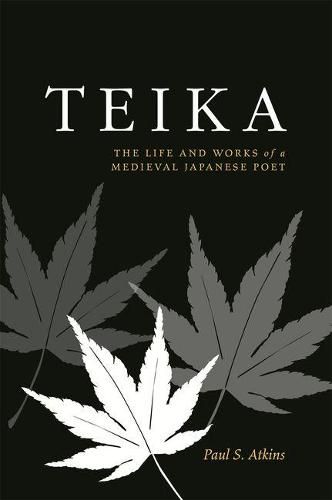Readings Newsletter
Become a Readings Member to make your shopping experience even easier.
Sign in or sign up for free!
You’re not far away from qualifying for FREE standard shipping within Australia
You’ve qualified for FREE standard shipping within Australia
The cart is loading…






Fujiwara no Teika (1162-1241) was born into an illustrious lineage of poets just as Japan’s ancien regime was ceding authority to a new political order dominated by military power. Overcoming personal and political setbacks, Teika and his allies championed a new style of poetry that managed to innovate conceptually and linguistically within the narrow confines of the waka tradition and the limits of its thirty-one syllable form. Backed by powerful patrons, Teika emerged finally as the supreme arbiter of poetry in his time, serving as co-compiler of the eighth imperial anthology of waka, Shin Kokinshu (ca. 1210) and as solo compiler of the ninth.
This first book-length study of Teika in English covers the most important and intriguing aspects of Teika’s achievements and career, seeking the reasons behind Teika’s fame and offering distinctive arguments about his oeuvre. A documentary biography sets the stage with valuable context about his fascinating life and times, followed by an exploration of his Bodhidharma style, as Teika’s critics pejoratively termed the new style of poetry. His beliefs about poetry are systematically elaborated through a thorough overview of his writing about waka. Teika’s understanding of classical Chinese history, literature, and language is the focus of a separate chapter that examines the selective use of kana, the Japanese phonetic syllabary, in Teika’s diary, which was written mainly in kanbun, a Japanese version of classical Chinese. The final chapter surveys the reception history of Teika’s biography and literary works, from his own time into the modern period. Sometimes venerated as demigod of poetry, other times denigrated as an arrogant, inscrutable poet, Teika seldom inspired lukewarm reactions in his readers.
Courtier, waka poet, compiler, copyist, editor, diarist, and critic, Teika is recognized today as one of the most influential poets in the history of Japanese literature. His oeuvre includes over four thousand waka poems, his diary, Meigetsuki, which he kept for over fifty years, and a fictional tale set in Tang-dynasty China. Over fifteen years in the making, Teika is essential reading for anyone interested in Japanese poetry, the history of Japan, and traditional Japanese culture.
$9.00 standard shipping within Australia
FREE standard shipping within Australia for orders over $100.00
Express & International shipping calculated at checkout
Fujiwara no Teika (1162-1241) was born into an illustrious lineage of poets just as Japan’s ancien regime was ceding authority to a new political order dominated by military power. Overcoming personal and political setbacks, Teika and his allies championed a new style of poetry that managed to innovate conceptually and linguistically within the narrow confines of the waka tradition and the limits of its thirty-one syllable form. Backed by powerful patrons, Teika emerged finally as the supreme arbiter of poetry in his time, serving as co-compiler of the eighth imperial anthology of waka, Shin Kokinshu (ca. 1210) and as solo compiler of the ninth.
This first book-length study of Teika in English covers the most important and intriguing aspects of Teika’s achievements and career, seeking the reasons behind Teika’s fame and offering distinctive arguments about his oeuvre. A documentary biography sets the stage with valuable context about his fascinating life and times, followed by an exploration of his Bodhidharma style, as Teika’s critics pejoratively termed the new style of poetry. His beliefs about poetry are systematically elaborated through a thorough overview of his writing about waka. Teika’s understanding of classical Chinese history, literature, and language is the focus of a separate chapter that examines the selective use of kana, the Japanese phonetic syllabary, in Teika’s diary, which was written mainly in kanbun, a Japanese version of classical Chinese. The final chapter surveys the reception history of Teika’s biography and literary works, from his own time into the modern period. Sometimes venerated as demigod of poetry, other times denigrated as an arrogant, inscrutable poet, Teika seldom inspired lukewarm reactions in his readers.
Courtier, waka poet, compiler, copyist, editor, diarist, and critic, Teika is recognized today as one of the most influential poets in the history of Japanese literature. His oeuvre includes over four thousand waka poems, his diary, Meigetsuki, which he kept for over fifty years, and a fictional tale set in Tang-dynasty China. Over fifteen years in the making, Teika is essential reading for anyone interested in Japanese poetry, the history of Japan, and traditional Japanese culture.